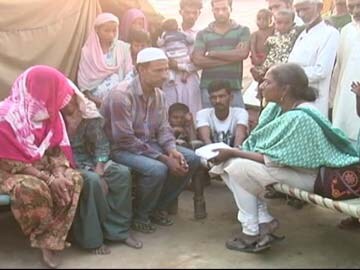
Most of the victims are too scared to go back to their homes.
Muzaffarnagar:
50 days after the Muzaffarnagar riots, a humanitarian crisis is unfolding in the relief camps. Thousands of victims, who belong to nine of the worst-hit villages, are living without any basic amenities.
13-year-old Shaista died on October 7 at Loee relief camp, a month after she fled a violent mob in Phugana village and hid in a forest with her siblings.
Her father, Mohammad Haroun, said, "She had fever for a few days before she died. It was as if fear had not left her system."
Officials say Shaista died of cerebral edema. But for her grieving father, it was the grief and trauma that killed her. She was among seven people who have died in Loee camp, two of them children.
About 4,000 people live here in these flimsy tents, vulnerable to cold, rain and disease. There are no sanitation facilities. Some women are forced to do with a makeshift bathing area with four sticks holding a plastic sheet.
In Basi Kalan camp, a young mother Afsana gave birth to a son in her tent three days ago. There was no medical facility or even a midwife; only her in-female laws.
Afsana's mother-in-law is worried. "The baby seems to be suffering. He cries a lot through the day and night."
Doctors say the umbilical cord is infected. If left untreated, it could cause septicemia, a life-threatening infection. Afsana too appears to be anaemic.
A visiting team of voluntary health workers and doctors from Kerala say their survey has shown that a majority of the inmates at relief camps are in need of medical aid. "Lot of infectious diseases are there; lots of protein malnutrition and other health issues," says a doctor.
These families, already poor, have been further hit by the riots. Children no longer go to school; young men loiter around.
At Basi Kalan camp, Yamin's injuries were caused by a sword. After the construction worker became unconscious, he was taken to a Meerut hospital.
"I have many injuries. If I raise my head, I feel faint," he says.
They need time and treatment to heal their physical wounds as well as their psychological ones.
At night when they sleep, dew collects on the tent and drips on them. There's no place to bathe, not even a toilet. Yet no one wants to return to their villages.
Sanjeeda, an inmate at Shapur camp, said, "We can die but we will not return, even if we have to live in a shack by the roadside. Eight members of my family were killed by villagers."
The state government has neither extended support nor has it prepared a rehabilitation policy.
An indifferent state government has even threatened to evict the people from Loee camp, alleging that the camp was set up on land belonging to the horticultural department.
Kaushal Raj Sharma, District Magistrate, Muzaffarnagar, says only after the inmates shift will the government extend facilities like mobile toilets, blankets, winter clothing and a community kitchen to them.
13-year-old Shaista died on October 7 at Loee relief camp, a month after she fled a violent mob in Phugana village and hid in a forest with her siblings.
Her father, Mohammad Haroun, said, "She had fever for a few days before she died. It was as if fear had not left her system."
Officials say Shaista died of cerebral edema. But for her grieving father, it was the grief and trauma that killed her. She was among seven people who have died in Loee camp, two of them children.
About 4,000 people live here in these flimsy tents, vulnerable to cold, rain and disease. There are no sanitation facilities. Some women are forced to do with a makeshift bathing area with four sticks holding a plastic sheet.
In Basi Kalan camp, a young mother Afsana gave birth to a son in her tent three days ago. There was no medical facility or even a midwife; only her in-female laws.
Afsana's mother-in-law is worried. "The baby seems to be suffering. He cries a lot through the day and night."
Doctors say the umbilical cord is infected. If left untreated, it could cause septicemia, a life-threatening infection. Afsana too appears to be anaemic.
A visiting team of voluntary health workers and doctors from Kerala say their survey has shown that a majority of the inmates at relief camps are in need of medical aid. "Lot of infectious diseases are there; lots of protein malnutrition and other health issues," says a doctor.
These families, already poor, have been further hit by the riots. Children no longer go to school; young men loiter around.
At Basi Kalan camp, Yamin's injuries were caused by a sword. After the construction worker became unconscious, he was taken to a Meerut hospital.
"I have many injuries. If I raise my head, I feel faint," he says.
They need time and treatment to heal their physical wounds as well as their psychological ones.
At night when they sleep, dew collects on the tent and drips on them. There's no place to bathe, not even a toilet. Yet no one wants to return to their villages.
Sanjeeda, an inmate at Shapur camp, said, "We can die but we will not return, even if we have to live in a shack by the roadside. Eight members of my family were killed by villagers."
The state government has neither extended support nor has it prepared a rehabilitation policy.
An indifferent state government has even threatened to evict the people from Loee camp, alleging that the camp was set up on land belonging to the horticultural department.
Kaushal Raj Sharma, District Magistrate, Muzaffarnagar, says only after the inmates shift will the government extend facilities like mobile toilets, blankets, winter clothing and a community kitchen to them.
Track Latest News Live on NDTV.com and get news updates from India and around the world

